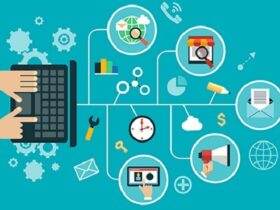Using a CRM is among the best ways for growing businesses to scale. However, one thing that businesses do not realize is that CRM, or customer relationship management, is both a process and a software. From a process point of view, a CRM can help keep every customer interaction personalized and meaningful. This can be done in a number of different ways, including reaching the right prospect, converting them into a customer, and then keeping their business by retaining them. Finally, you’ll want to make sure that they come back for years to come by building customer loyalty.
However, a CRM does not just end as a process. At this point, you might be asking what is a CRM software. A CRM software allows you to move beyond just spreadsheets and free organizational tools and actually systemize the CRM process within a software. There are many CRMs that specialize within an industry and allow you to enter and analyze particular information. For example, a hotel chain may have different needs with their customers than a construction company, and a specialized industry CRM can reflect that with the data points that it tracks and the type of clientele it looks to appeal to.
Before a CRM software can be implemented though, you need to have a capable staff in place who can actually analyze the customer data that is being collected. A CRM software can actually give your staff a variety of insights into how to best deal with customers and acquire new ones. But before that is done, you need to have an understanding of how CRM software works and how it can best be utilized by your business.
How businesses can best use CRM software
A CRM software allows businesses to analyze much of their customer data. This can be beneficial in a number of ways. For one, it allows businesses to find ways to better connect with their customers, and opportunities they can use to improve their own processes. By doing this, businesses can reap the benefits of their customer data by using it to come up with better marketing and sales strategies.
In doing this, they can also differentiate their lead types. These leads are generally grouped into SQLs and MQLs. What this means is that these leads either came through sales or marketing initiatives. How a lead enters a CRM not only determines how they need to be interacted with but also what they may be expecting from your company. By differentiating between the two types of leads, a CRM can help you better segment your customers and understand ways that you can relate with their buyer’s journey.
Overall, there are numerous reasons as to why a business might choose to use a CRM software. However, in order to actively implement the CRM process, it is best to use a CRM software to do so. By more actively managing your relationships with your customers, you’ll find that you will have a better sense of what they are looking for. This will, in turn, help you organize your own processes better so that you can better meet your customer’s need and understand what they are looking for when transacting with your business.










